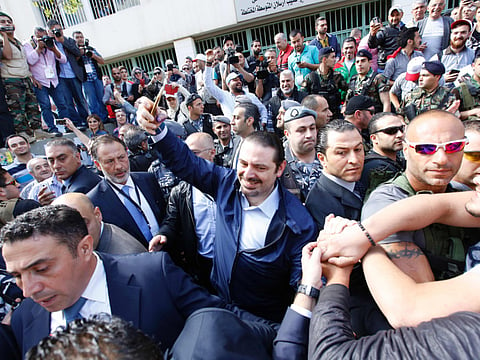Feudal lords maintain grip on Lebanese politics
Hariri, for his part, emphasised that a vote for his list was a vote for Christian-Muslim parity

Beirut: Even if the 40th parliamentary session to elect a new head of state on Tuesday met a fate similar to its predecessors — postponement due to a lack of quorum — while the 28th Hezbollah Future Movement dialogue session stressed the need to “reach consensus on the new electoral law as soon as possible”, results gathered by “Beirut Madinati” in last Sunday’s municipal elections heralded a significant new development on Lebanon’s socio-political scene.
In a classic feudal environment, the “Beirutis” list supported by former Prime Minister Sa’ad Hariri, swept all 24 seats in the capital with Yusra Sidani posting the highest score (47,465 votes).
In comparison, Ebrahim Mneimneh, who headed the “Beirut Madinati” list, managed to secure 31,933 votes and though this was an incredibly large figure, 23 other candidates somehow managed to garner more votes and were thus elected to office. In the end, the official results issued by the Interior Ministry showed that the “Beirutis” list, led by Jamal Itani, won about 15,000 votes more than “Beirut Madinati”. Because there is no proportional system in place, the feudal system won, though the numbers indicated that few should take solace in these municipal council election results. They highlighted existing tensions among the electorate that looked for alternatives and, at least for some, found them in “Beirut Madinati”.
With very limited resources, Mneimneh and the 23 members of various civil society groups that included artists, intellectuals, and, for the first time in the history of Lebanon a gender-free list with 12 men and 12 women sharing the spotlight, successfully challenged the current authority. What their accomplishments meant were far more telling that analysts assumed as a significant numbers of voters cast ballots for true change.
Hariri, for his part, emphasised that a vote for his list was a vote for Christian-Muslim parity as an irrevocable fact, though it was clear that his list could not have won without the backing of key Christian parties, including the Phalange, the Lebanese Forces, and the Free Patriotic Movement, which placed feudal interests ahead of any other consideration to secure victory for the “Beirutis” list,
In fact, the same was true in Zahleh, the Biqa‘ city where true competition arose, though in this instance as well feudal lords circled the wagons and achieved their desired goals. The next battle on Sunday, when Mount Lebanon goes to the polls, will show whether rival Christian lists will manage to present unified positions or, more likely, whether hotly contested battles in key strongholds like Jounieh will highlight existing divisions.
In this instance, the “Jounieh’s Dignity” list is backed by the Free Patriotic Movement and the Phalange, against an opposing ticket supported by the Lebanese Forces. In Sin Al Fil, the current mayor, Nabeel Kahaleh, is facing competition from a rival list backed by the FPM and the LF, a phenomenon duplicated in many towns and villages across Mount Lebanon.
Ironically, politicians acknowledged that the results of municipal elections in Beirut, illustrated voter dissatisfaction with the accumulation of corruption files, the garbage crisis and the illegal internet operations, among others, which most voters loath. Buoyed by last Sunday’s relatively peaceful conduct, Speaker Nabih Berri declared that it was possible to hold parliamentary elections following the successful municipal polls, though he reluctantly conceded that he had no choice but to adjourn yet another moribund session of the current body to June 2 because elected officials failed in their constitutional obligations.
Interestingly, Berri concluded that Parliament’s mandate, which was extended twice in 2013 and 2014, can be shortened to elect a new legislative body. “Following the holding of municipal elections, it is possible to conduct parliamentary elections and shorten Parliament’s term if an agreement is reached on a new electoral law,” he announced, although he did not admit that there was no consensus on a new rule.
In the event, Berri avowed that Parliament’s term would not be extended again no matter what happens. “We are facing two choices,” he stressed. “We either reach a modern electoral law based on proportional representation, or we will fall back on the Doha law which some call the 1960 law.”
The 1960 electoral law, used last in the 2009 legislative polls, is based on a winner-take-all system with constituencies based on the country’s administrative districts. The key Christian parties oppose this law on the grounds that it does not ensure true representation of Christians in Parliament although it ensures the existing feudal system that favours the establishment — both Christian as well as Muslim.
Forty-one lawmakers, mostly from the March 14 coalition, bothered to enter Parliament in Beirut’s Nejmeh Square on Tuesday to attend the solemn session to elect a successor to President Michel Sulaiman. The latter, whose tenure ended on May 24, 2014, prepared to celebrate his second year out of office in a fortnight.
Sign up for the Daily Briefing
Get the latest news and updates straight to your inbox



